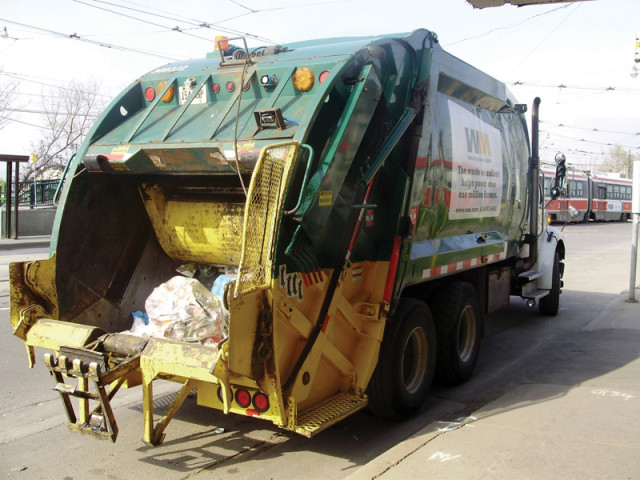Health hazard: Major hospitals lack waste disposal system
Hazardous and non-hazardous waste poses threat to people, environment.

More than 40 public and private hospitals, clinics and laboratories in the federal capital do not have incinerators for disposing of medical waste, which in turn pose a serious threat to environment and human life.
According a recent survey conducted by the Environment Protection Agency (EPA), all but two hospitals in the twin cities depend on a private firm for collection and disposal of dangerous medical waste, which averages more than 2,100 kilograms (kg) per day.
While Shifa International Hospital (SIH) and Kahuta Research Laboratories (KRL) Hospital have their own facilities, others in the public and private sectors rely on National Cleaner Production Centre (NCPC) — a facility in Morgah owned by Attock Refinery Limited — for waste disposal. NCPC can only dispose of 200kg of infectious waste per day, while hospitals in Islamabad alone generate approximately 2,158kg of medical waste per day— of which 500kg is infectious and 1,658kg is not infectious.
The rest of the waste is either dumped in open spaces, along roadsides, or sold to scrap vendors as no regulatory body keeps records of medical waste in the twin cities.
“NCPC collects a total of around 200kg of waste per day from different hospitals in Islamabad and Rawalpindi,” Dr Irshad Ramay, a doctor affiliated with NCPC, told The Express Tribune.
“NCPC charges Rs25 per kg from these hospitals,” he said.
NCPC’s contribution towards waste disposal barely makes a dent in the total generated.
“Some hospitals and clinics dump their hazardous waste in municipal garbage trolleys, which not only poses a serious threat to the environment, but also human life,” said an EPA official on the condition of anonymity.
It is estimated that a 100-bed hospital would generate 50kg infectious and 200kg non-infectious waste per day.
Interestingly, the management of Pakistan Institute of Medical Science (Pims), which has 600 beds, told the EPA survey team that it only generates 150kg of infectious and 300kg of non-infectious waste per day. The management of the Polyclinic, which has 545 beds, told the EPA team that the hospital generates 120 to 150kg infectious and 300 to 350kg non-infectious waste per day.
Shaheed Zulfikar Ali Bhutto Medical University Vice-Chancellor Javed Akram claimed that the hospital (Pims) generates 30 to 50kg infectious waste per day, depending on the types of surgeries conducted on any given day. He also said that waste generation increases as the number of cardiac surgeries increase. The EPA official, however, said both hospitals generate much more waste than what they claim.
According to the EPA official, the incineration plant at the Pims is not functioning, while the one at Polyclinic is only partially functional, and both hospitals also outsource their waste, but how-and-where it goes is up in the air as no appraisal system to keep check is in place.
SIH, which has 440 beds, is the only private hospital which has its own incinerator, where 600kg of infectious and 700 to 800kg of non-infectious waste is disposed of every day.
KRL Hospital, a 250-bed facility, generates 25kg to 30kg infectious and 500kg non-infectious waste per day. According to the KRL management, the non-infectious waste is segregated from infectious waste at the point of generation, and infectious waste is sent to the incinerator.
The 280-bed Capital Development Authority Hospital generates 20kg of infectious waste per day, while 50-bed Ali Medical Centre, a private setup, produces 10kg of infectious and 30kg of non-infectious waste per day. Similarly, 50-bed Kulsoom International Hospital generates 40 to 50kg infectious and 80kg to 90kg of non-infectious waste per day. The 50-bed Maroof International Hospital generates 25kg of infectious and 50kg of non-infectious waste per day. The Islamic International Medical and Dental Hospital generates infectious 8 to 10kg and 8 to 12kg non-infectious waste per day. All these hospitals outsource their medical waste to the NCPC.
Interestingly, according to the EPA survey report, the eight-bed Mariyum Hospital generates no infectious waste and just 500 grams of non-infectious waste.
Meanwhile, among testing facilities, Excel Labs generates 15kg of infectious and 7 to 10kg of non-infectious waste per month, Islamabad Diagnostic Centre generates 15 to 20kg of infectious and 20 kg non-infectious waste per day, and Fatima Medical Labs generates between two and three kg of infectious and three to four kg of non-infectious waste per day.
“According to the laws, every hospital is responsible for proper waste management until final disposal,” EPA Director Dr Ziauddin Khattak said.
Published in The Express Tribune, December 30th, 2014.



















COMMENTS
Comments are moderated and generally will be posted if they are on-topic and not abusive.
For more information, please see our Comments FAQ